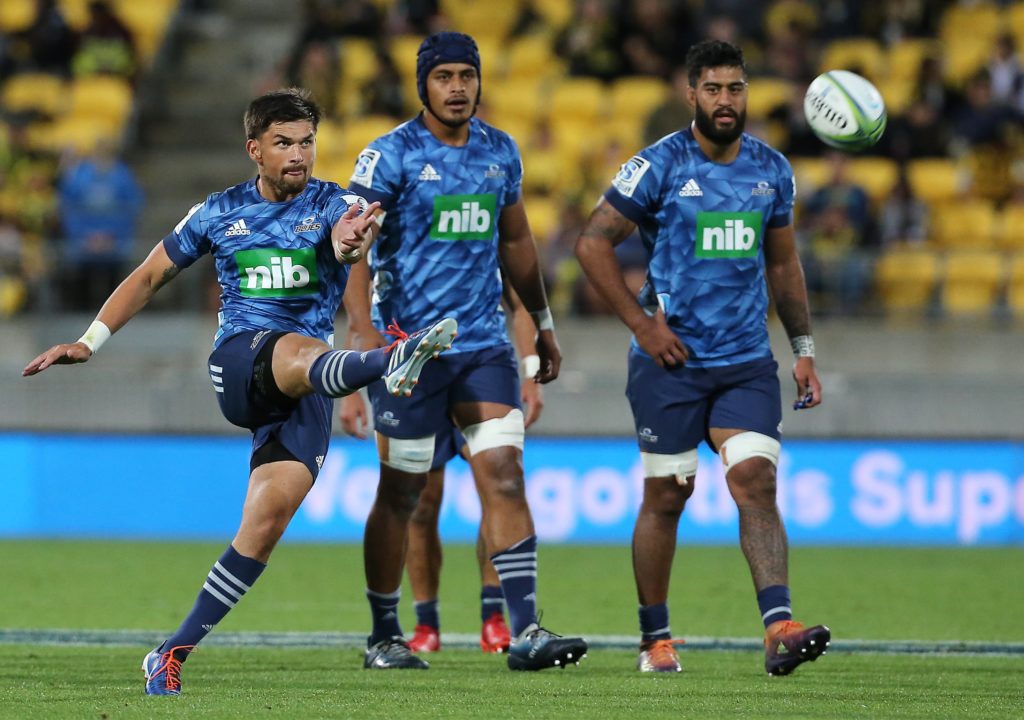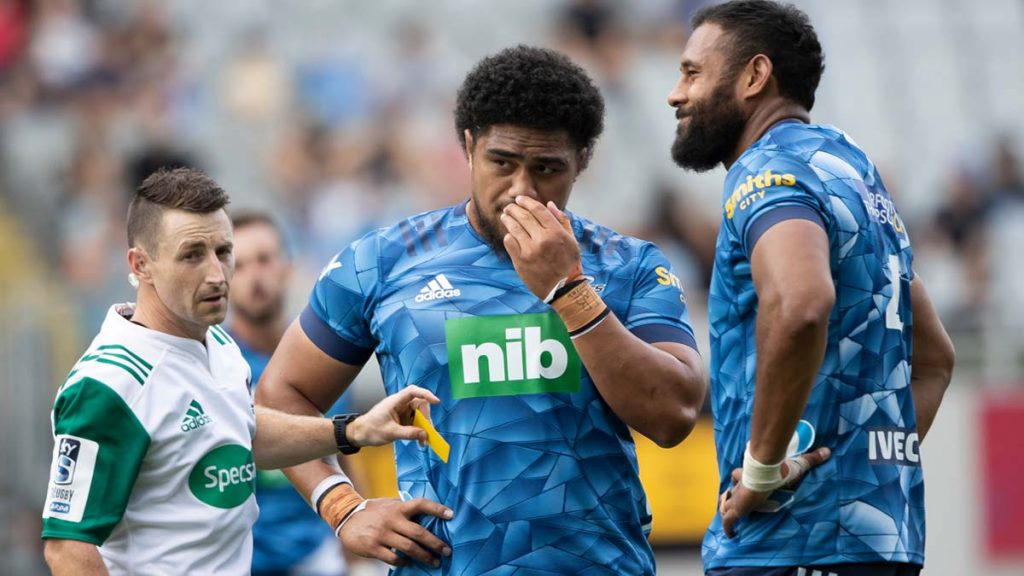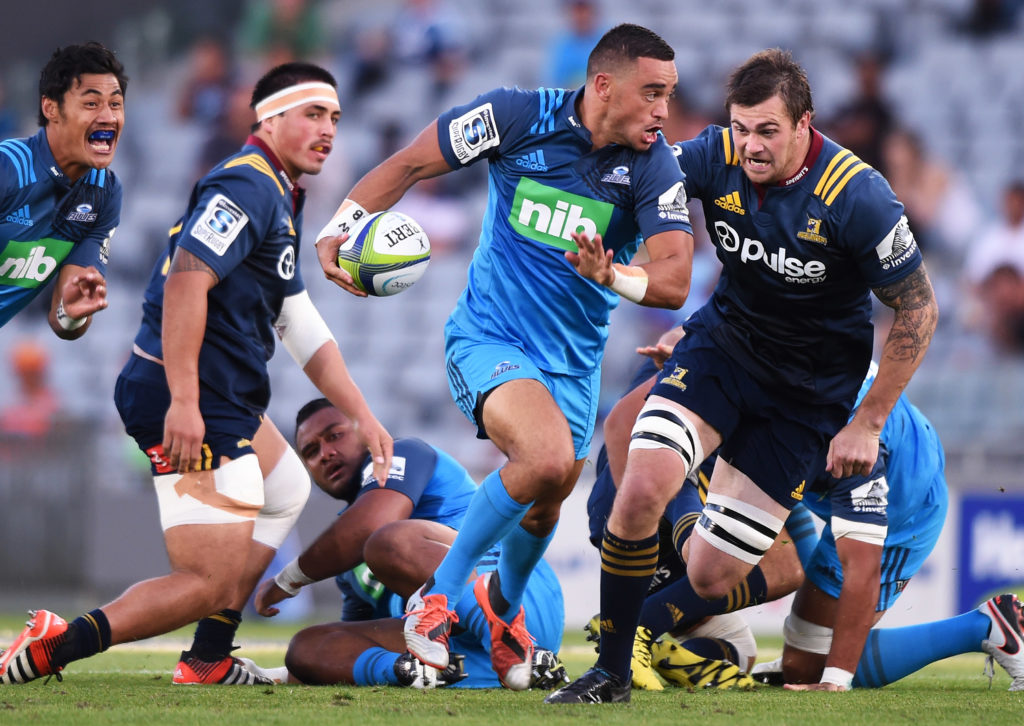During the Blues’ 25-derby losing streak, which was snapped last year – pre-Covid – after they returned from two wins in South Africa and beat the Hurricanes in a remarkable performance in Wellington, one thing in particular held them back.
They panicked when they entered good attacking positions – and this despite a vast and varied array of weapons in their backline, including Rieko Ioane.
Get into a rival team’s 22m area and they could be relied upon to make a hash of it via a poor decision or handling error. The points and positive results went begging and so did their chances of turning around a franchise that has always contained a huge amount of talent but which, ever since their last Super title in 2003, has rarely been used to its full potential.
Now it’s a little different. Since the beginning of last year, the Blues have comfortably appeared New Zealand’s second best team behind the perennial champion Crusaders. The corner has been turned, admitted former Blues legend Sean Fitzpatrick on Sky’s The Breakdown show recently.

Derby matches – home or away – no longer pose the problems they used to (Crusaders apart). In many ways, head coach Leon MacDonald has moulded his team into his own image on attack; they’re calm, methodical and increasingly accurate. Actually, they’re probably a bit better than that this year as they’ve scored 13 tries in three matches, including four against the Crusaders at Eden Park last Sunday. They’ve become ruthless in the red zone.
Their excellent recent recruitment record has been well publicised, and they’ve combined that traditional free-running Blues style with a forward pack that wouldn’t look out of place in international rugby. It’s a compelling and entertaining package.
And yet, while they matched the Crusaders try for try at Eden Park (four each), in a match rightly hyped as the clash of the two best teams in the competition, the visitors exposed some familiar frailties in the Blues when finishing over the top of them 43-27.
It wasn’t that the Blues made poor decisions on attack or got the handling yips when they were in sight of the try-line, but it was similarly mental – a frustrating habit of letting their opponents off the hook via a regular series of infringements and penalties further down the pitch.
They couldn’t string scores together and build pressure on a side which transitions from defence to attack as quickly as any team coached by Scott Robertson has. They’d score a try – for example, hooker Kurt Eklund’s well-taken second in the left corner – and then do something silly like Eklund’s body slam of Crusaders wing Sevu Reece which reversed a penalty and put the Blues straight back under the blowtorch.
It must have been infuriating for MacDonald to watch his pack match the Crusaders’ set piece and then see such recklessness, although he put a positive spin on it afterwards.
“It was four tries each,” MacDonald said. “I’m definitely not blaming the referee, but a couple of those penalties, I’m looking at them, thinking they were really tough.
“The scrums had good parity, we contested well around the tackle breakdown area, we were able to create space, there’s a lot to be happy and excited about. But we’ve got to be better than what we were, because ultimately the scoreboard reflects a dominant victory to them.

“So there’s enough for us to take away, to feel optimistic around how we’re tracking and how we’re playing and if we were beat up in a lot of those areas I’d feel differently, but I don’t think we were.
“I think most of the stats would be pretty equal. The discipline wasn’t – they were better than us.
“We’d been really good with discipline up to now and that’s the first game that we’ve got on the wrong side of the ledger around the discipline and that’s disappointing for us.
“But overall, there were a lot of areas in the game where we felt we were competing well.”
There were other differences too of course, most notably in the quality and form of the respective No 10s, Richie Mo’unga and Otere Black, and the men immediately inside and outside them providing possession and assistance.
Black has been good for the Blues in Super Rugby Aotearoa. He’s solid and dependable, kept Beauden Barrett out of the role last year before injury, and, before last weekend, has guided the Blues around the field well.
We’d been really good with discipline up to now and that’s the first game that we’ve got on the wrong side of the ledger around the discipline and that’s disappointing for us.
Leon MacDonald on the Blues’ loss to the Crusaders
But the gulf in class between Black and Mo’unga is huge. The Crusader and All Black can change a match with a moment of magic and his ability to create and execute mismatches is up there with the best in the world. Indeed, he did just that with his superb individual try for a personal haul of 28 points.
“I like these moments, right in the pressure-cooker,” said Mo’unga afterwards. “That’s where I want to be. It’s where I perform the best under pressure. It brings out the best in me, and it brings out the best in the team.
“For a few bits in that game we were under the pump, right under our posts. You look around, you’ve got all these eyes looking at you and it gives you a good indication they don’t want to be anywhere else too which is great.”
But he also has the added advantage of playing with a second-five in the form of David Havili, a talented operator with vision, pace and experience. Black had Harry Plummer, a converted first-five, outside him in the No 12 jersey. Again, the gulf in quality is large.
And while there are far bigger stars than Bryn Hall and Mitchell Drummond in the Crusaders, the two halfbacks play their roles to near perfection for Robertson’s team; they are accurate, get to near endless breakdowns, and clear the ball quickly – far quicker than Jonathan Ruru, the starting Blues’ halfback last Sunday.

Ruru is extremely fit and can pose a threat with the ball but his ability to put his team on the front foot via a crisp delivery from the base of a ruck is behind both Hall, the Aucklander who played his 100th Super Rugby match last Sunday, and Drummond, and even Blues rival Finlay Christie, a No 9 who has had more than his share of injuries since joining from the Hurricanes.
The Blues looked better for Christie’s entrance for the final quarter at Eden Park. The 25-year-old, who has extended his Blues contract to the end of next season, probably requires a run of games to hit peak performance but, having been coached by MacDonald at Tasman and persuaded to move north for the start of last season, appears the best option to spark a backline which has plenty of firepower in the form of Ioane, Caleb Clarke, Mark Telea, Stephen Perofeta and Emoni Narawa.
Ruru’s decision to fire a long pass in the second half which went over the head of fullback Perofeta and put the Blues under even more pressure is unlikely to have gone down well with MacDonald either.
while there are far bigger stars than Bryn Hall and Mitchell Drummond in the Crusaders, the two halfbacks play their roles to near perfection for Robertson’s team; they are accurate, get to near endless breakdowns, and clear the ball quickly – far quicker than Jonathan Ruru, the starting Blues’ halfback last Sunday.
The mistakes weren’t happening in the opposition’s danger zone, which may be of some comfort. But they were still happening and it highlighted an inability to deal with the pressure the Crusaders exerted through their suffocating defence.
It must have been hugely disappointing for a franchise which hasn’t beaten the Crusaders since 2014. Robertson’s men have killed a few dreams in winning four titles in four years and, despite colliding with a solid Blues set piece, appear to have the measure of their old rivals once again.
The Blues remain in the hunt, though, and, barring a spectacular collapse, should face the Crusaders in the grand final on May 8.
Time to iron out some wrinkles, perhaps, but another looming issue may be presented by the likely venue – the Crusaders’ fortress in Christchurch. The red and blacks have never lost a playoff match they have hosted. They thrive on the pressure and expectation, the eyes looking back at them. The Blues? Not so much, or at least not yet.



Comments
Join free and tell us what you really think!
Sign up for free